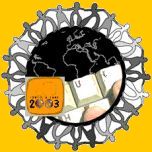

Berichte
VIVA BAMAKO!: AFROCENTRIC FORUM IS A SUCCESS
(from Zarina Geloo, IPS/TerraViva)
Goita told Terra Viva that issues which were specifically African had a bigger space at the Bamako forum because more Africans were able to participate in the discussions and raise their specific issues.
"Africanising the issues was not deliberate, it just so happened that this is the first time we have had a majority of Africans attending a WSF. Usually there have been less than 100 African NGOs at any of the other WSF.…It was too expensive for most Africans to travel to Porto Alegre or Mumbai."
He gave the example of the sessions on women, which focused on female genital mutilation, early marriage and illiteracy among girls. Similarly the issue of Western Sahara was given prominence at the forum, as were those of other African conflict areas like the Democratic Republic of Congo (DRC) and Sudan.
While issues were not exclusively African, the forum benefited from the strong inputs made by a plethora of specialist African NGOs and civil society.
"We had over 300 people from the rural areas of Mali alone, while another 8,000 came from neighbouring countries. All of them participated in the forum and enriched the discussions. This has never happened before."
Another first was the creation of a separate space to discuss children's issues such as alternative tools for educating children in rural settings. A youth forum, set up at the Modibo Keita Stadium, gave young men and women the rare opportunity to interact with village elders and other 'older citizens' on issues that affect their lives, including unemployment, immigration and education.
"This was unique because usually the youth forum is left to its own devises and they discuss and debate among themselves."
Adding a little innovative touch in putting across a new agenda, the Mali Social Forum organised a 15 km solidarity-run to focus on the commercialization of sport, with sportsmen and women, particularly from Africa, being traded on the international market.
"Another sport is possible, not one where people are bought and sold like commodities. We should have sports where people are treated with dignity and the joy of the game remains intact. It must not become just another business transaction," said Goita.
While he could not give an exact figure on how many people attended the forum, he said from police reports and registration figures it was around 11,000. There were between 300 and 700 activities daily – more than the number originally envisaged.
All this took a lot organising, helped in no small measure by a contribution of 150 million CFA by the Malian government – one of the poorest in the world – and its offer to open up some of its facilities such as conference halls, the national museum and libraries for the events.
However, there were still some bits that fell through the crack – accommodation and sanitation were in short supply and some times plain inadequate.
Participants had their own challenges. Chele Degruccio from the Lutheran World Federation in Kenya said she found it difficult to participate in the sessions because either people did not turn up for the meetings or showed up late and she had to leave for other sessions.
Miodrag Shrestha from Serbia and Montenegro said he had better luck with the sessions but the translation was inadequate. Sessions were supposed to have been translated into French, English, Portuguese and the local language, Bambara.
But Margaret Da Costa from a human rights group in Angola was upbeat. Though her accommodation fell short of expectation (the lodge had no water) and though she could not follow most of the sessions because there was very little Portuguese translation, and got lost trying to find buildings, she says it is "fantastic" that a poor country like Mali could host a global event successfully.
"People are talking and networking, that is what is important – not our own little problems caused by attending a conference in a country with serious constraints."


